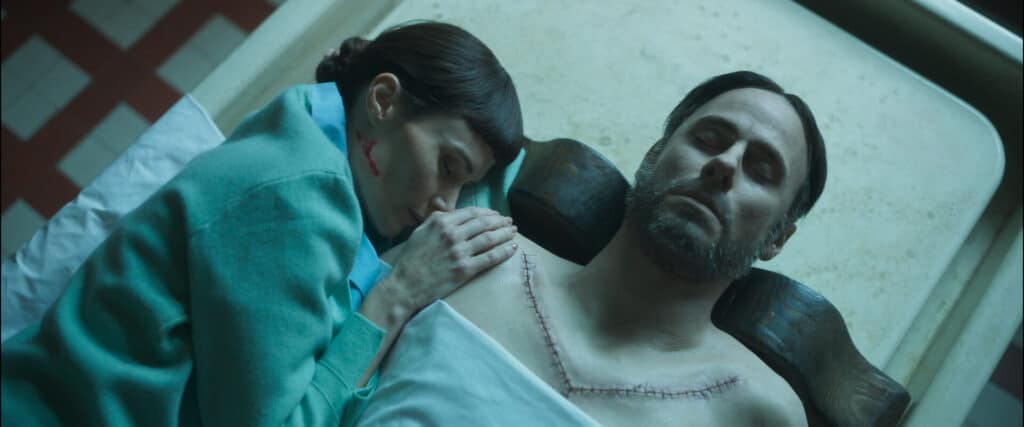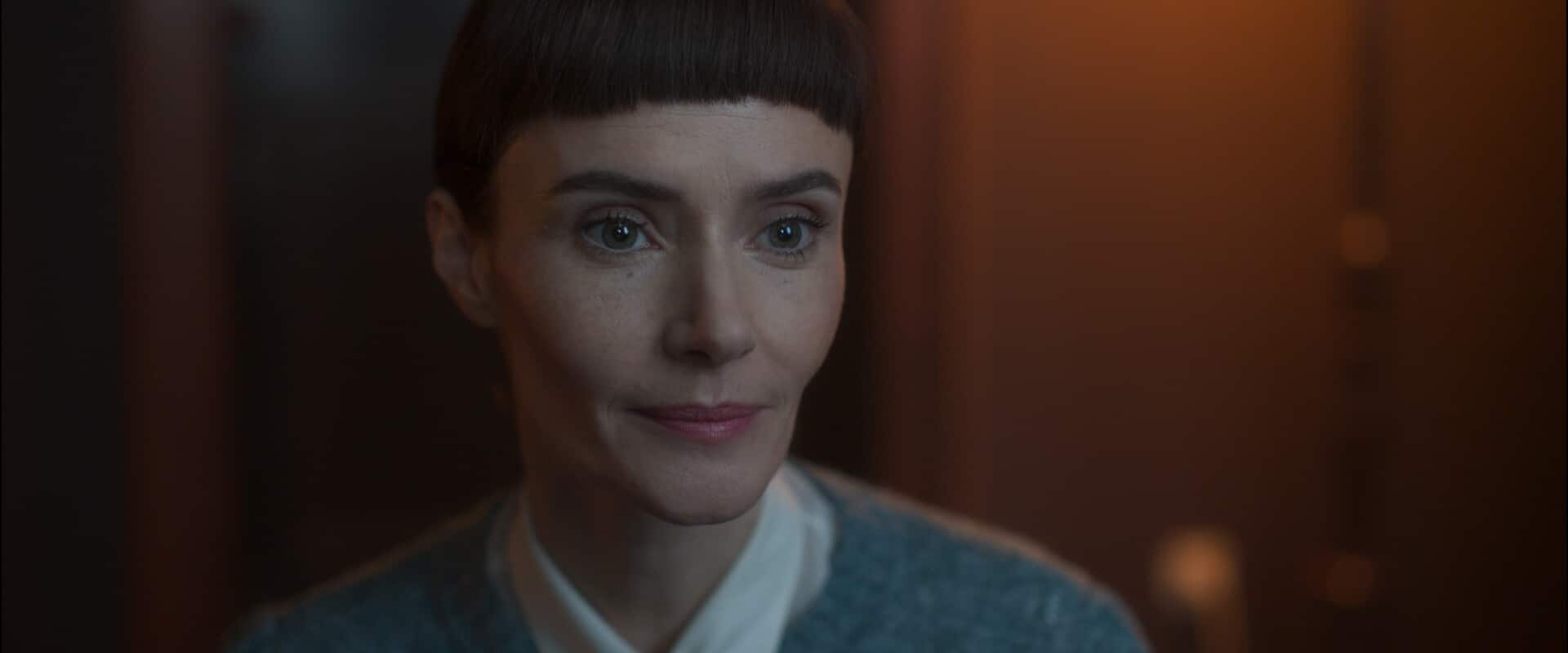
If Broken Bird (2024) begins unusually literally, then it soon becomes something far more complex and symbolic than that: its depiction of the nervy, prim Sibyl (Rebecca Calder) suggests from the earliest moments that something about this character is barely restrained, and that we will discover more anon. But in getting there – despite a few dithers and issues at the midway point – the film is increasingly brilliant and artfully tense, an uneasy piece of modern Gothic which pries away at modern attitudes to death and grief.
Sibyl, it seems, is a taxidermist: we see her working carefully on a dead bird at the very start of the film, with close macro shots showing the care and skill needed to preserve its little body. We see the bird; we don’t see the taxidermist herself very closely yet. She’s a bundle of snippets – a glimpse here and there of eyes, hair, hands. Finally, we see a little more of her, and are introduced to some of her other hobbies. She’s into composition as well as decomposition, it seems – sorry for that, but it kinda works here. Sibyl writes and performs her own poetry. However, whilst she performs at a regular open mic night, we don’t really see her interacting with anyone there. It’s all rather singular; whenever she encounters someone, she seems to either emulate them, or weave them into fantasies which stand in for whatever is really taking place.
However, when she gets a professional opportunity to take on a new role in a funeral home, this seems to suit her well. Being nervy and prim isn’t such a big deal when your clients are deceased and the affable, if traumatised Mr. Thomas (James Fleet) is glad of the help: work is all that’s keeping him going since the loss of his beloved wife. Sibyl is able to bring her past working experience to bear on her new role, and things go well – from the perspective of Mr. Thomas, anyway. The more time we spend with Sibyl, the more we see hints of some buried trauma in her own life. She responds to this by seeing connections which aren’t there – such as with museum assistant Mark (Jay Taylor) – or fantasising conversations which never even happen.
Elsewhere, we meet a woman called Emma (Sacharissa Claxton). In one of the film’s crossover moments, just as Sibyl ostensibly seems to be finding her way with her new job, Emma is losing her grasp on her own. She works for the police, but three months prior, Emma lost her young son. This loss haunts her, making it almost impossible for her to perform properly, and threatens to drive a wedge between her and her colleagues. As this all happened locally, Emma’s police force is the one charged with investigating what happened to the little boy. Two lives, two ways of dealing with grief: as we are introduced to both women, we can infer that something will unite them, but for now, we can only guess at the connection. In the meantime, we spend most of our time with Sibyl.
On reflection, the thing which makes Broken Bird finally blossom is the very same thing which, at some points during its runtime, makes that kind of connection feel unlikely. By sticking closely with Sibyl, we see the world of the film unfolding through her. At times, this means quite unexpected quirky humour, albeit framed with a kind of dour British quality, a few ‘should we laugh?’ moments in amongst everything else. Sibyl initially seems a little like Fran from Sometimes I Think About Dying, a similarly sad, complex woman given to grandiose fantasies about the kind of life – or death – she imagines for herself. Since we’re talking about films with similar themes and/or approaches, a comparison with May is perhaps the most obvious one to make: there are arguably even some mirrored scenes here.
But there’s a lot of complexity involved in figuring Sibyl out, arguably more so than with May, whose loneliness is clearer earlier; we can’t trust what we see with Sibyl, whilst still knowing that this is a woman who has made an artform out of concealment. We never get openly told about her motivations; we’re simply faced with her increasingly oddball behaviours, made to act like observers with no insider knowledge, and there are no internal monologues or special explanations to tell us what’s what. Add to that a run of still-mysterious, fantasised scenes accompanied with lively, even lullaby-like music and it’s hard to know what to think. The shifts in tone and Sibyl’s long, sometimes light-hearted deviations into idealised scenarios are, without a doubt, challenging in places. At around the hour mark the film is spread thinnest, with a perhaps unclear mood which may alienate some viewers. Likewise, you need to wait to pick up Emma’s storyline, which may make you wonder how things will work out.
Stick with it. What director Joanne Mitchell is doing here is making us think like Sibyl. And, once we do that – really do that – the film is able to move into an almost unbearable, if always artistic finale which grows so unendurably intense that it makes your heart feel like it’s going to shatter. The ways in which Broken Bird loops back to resolve its narrative gaps are incredibly assured, and its novel approach to storytelling is worth the wait. It’s a jigsaw puzzle this, where – once you work out what you’re actually looking at – you recoil in fascinated horror. But as for the picture itself! It’s one of the most aesthetically-pleasing films I have ever had the pleasure to see, a strangely graceful nightmare and an impressive first feature from Joanne Mitchell.
Broken Bird (2024) both received its World Premiere and opened this year’s FrightFest 2024.
